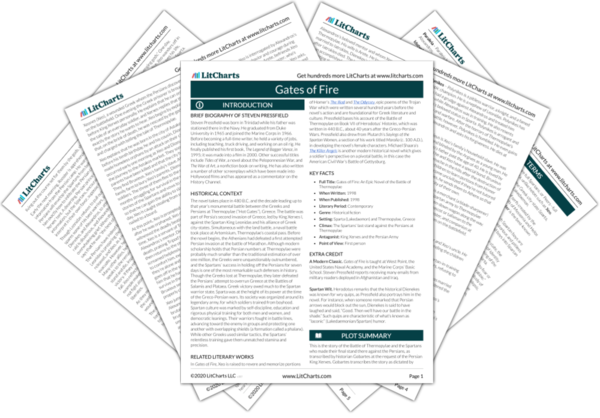Bruxieus Quotes in Gates of Fire
“Listen to me, boy. Only gods and heroes can be brave in isolation. A man may call upon courage only one way, in the ranks with his brothers-in-arms, the line of his tribe and his city. Most piteous of all states under heaven is that of a man alone, bereft of the gods of his home and his polis. A man without a city is not a man. He is a shadow, a shell, a joke and a mockery. That is what you have become now, my poor Xeo. No one may expect valor from one cast out alone, cut off from the gods of his home.”

Unlock explanations and citation info for this and every other Gates of Fire quote.
Plus so much more...
Get LitCharts A+Bruxieus began to fear for us. We were growing wild. Cityless. In evenings past, Bruxieus had recited Homer and made it a game how many verses we could repeat without a slip. Now this exercise took on a deadly earnestness for him. He was failing, we all knew it. He would not be with us much longer. Everything he knew, he must pass on.
Homer was our school, the Iliad and Odyssey the texts of our curriculum […] Bruxieus tutored us relentlessly in compassion, that virtue which he saw diminishing each day within our mountain-hardened hearts […]
We must have a city, Bruxieus declared.
Without a city we were no better than the wild brutes we hunted and killed.

Bruxieus Quotes in Gates of Fire
“Listen to me, boy. Only gods and heroes can be brave in isolation. A man may call upon courage only one way, in the ranks with his brothers-in-arms, the line of his tribe and his city. Most piteous of all states under heaven is that of a man alone, bereft of the gods of his home and his polis. A man without a city is not a man. He is a shadow, a shell, a joke and a mockery. That is what you have become now, my poor Xeo. No one may expect valor from one cast out alone, cut off from the gods of his home.”

Unlock explanations and citation info for this and every other Gates of Fire quote.
Plus so much more...
Get LitCharts A+Bruxieus began to fear for us. We were growing wild. Cityless. In evenings past, Bruxieus had recited Homer and made it a game how many verses we could repeat without a slip. Now this exercise took on a deadly earnestness for him. He was failing, we all knew it. He would not be with us much longer. Everything he knew, he must pass on.
Homer was our school, the Iliad and Odyssey the texts of our curriculum […] Bruxieus tutored us relentlessly in compassion, that virtue which he saw diminishing each day within our mountain-hardened hearts […]
We must have a city, Bruxieus declared.
Without a city we were no better than the wild brutes we hunted and killed.











